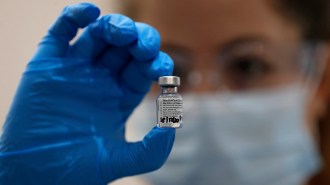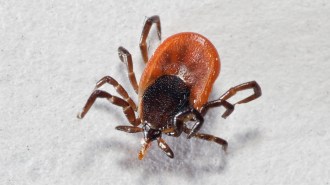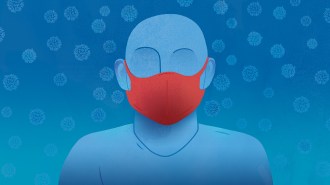Health & Medicine
-
 Animals
AnimalsA mink in Utah is the first known case of the coronavirus in a wild animal
A U.S. mink is so far the only known free-ranging animal to have contracted the coronavirus and likely got infected from a nearby mink farm.
-
 Science & Society
Science & SocietyThese 6 graphs show that Black scientists are underrepresented at every level
In the U.S., Black people are underrepresented in STEM fields, both as students and in the workforce.
-
 Health & Medicine
Health & MedicineThe FDA has authorized Pfizer’s COVID-19 vaccine. Now what?
It’s the first to win emergency use approval in the United States.
-
 Science & Society
Science & SocietyThis COVID-19 pandemic timeline shows how fast the coronavirus took over our lives
Look back on how the coronavirus pandemic took over 2020 and how efforts to fight back evolved.
-
 Health & Medicine
Health & MedicineExperts recommend the FDA approve Pfizer’s COVID-19 vaccine for emergency use
Pfizer-BioNTech’s COVID-19 vaccine is one step closer to emergency use authorization in the United States.
-
 Health & Medicine
Health & MedicineHow some ticks protect themselves from deadly bacteria on human skin
A gene that ticks acquired from bacteria 40 million years ago may help the arachnids keep potential pathogens at bay while feeding on blood.
-
 Health & Medicine
Health & MedicineAs 2020 comes to an end, here’s what we still don’t know about COVID-19
After making fast progress understanding COVID-19, researchers are still in search of answers.
-
 Health & Medicine
Health & MedicineHere’s what you need to know about the COVID-19 vaccines
There are still important unknowns about how Pfizer’s vaccine and others will work once they get injected in people around the world.
By Tina Hesman Saey and Jonathan Lambert -
 Health & Medicine
Health & MedicineThe ‘last mile’ for COVID-19 vaccines could be the biggest challenge yet
The need for cold storage and booster shots could create problems for distributing coronavirus vaccines to nearly everyone in the world.
-
 Health & Medicine
Health & MedicineThe U.K. is the first country to authorize a fully tested COVID-19 vaccine
Pfizer will deliver the first of 40 million doses of its coronavirus vaccine promised to the United Kingdom in the coming days.
-
 Health & Medicine
Health & MedicineHealth care workers and long-term care residents should get COVID-19 vaccines first
With an initial 40 million doses of the vaccines, enough for 20 million people, anticipated by year-end, health officials are setting priorities.
-
 Health & Medicine
Health & MedicineLong-lasting shots work better than daily pills to prevent HIV in at-risk women
A more discreet HIV prevention method — a shot once every eight weeks —could help to boost use in women at risk.